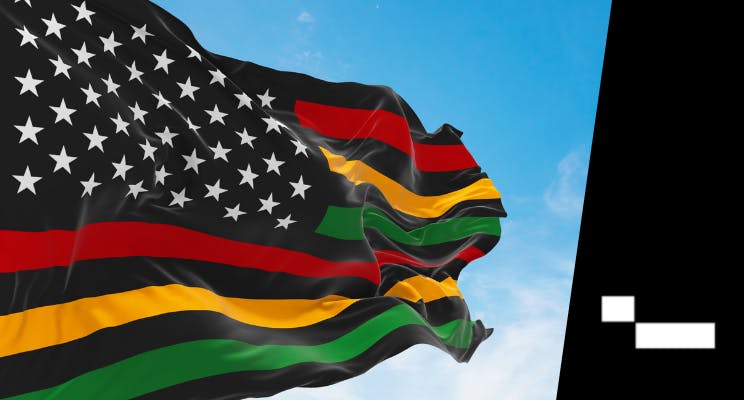When Black History Month Is Over...
By Bashar Wali
Why aren’t we talking about Mary J. Blige the way we talked about J.Lo at age 50? At 51, Mary J. took us to church between her male counterparts at the Super Bowl. No More Drama was my anthem when I still had headphones with cords. Now here I am, a little less carefree and a little more grey, standing in my living room singing along to every word. I may not remember what I walk into my kitchen for, but Mary J lyrics? Embedded forever.
Epic nostalgia halftime show aside, is it really the end of February 2022, and we are still holding onto just one month (the shortest one) to celebrate Black history?
There’s no denying the importance of Black History Month. It’s an opportunity to reflect and learn about the African diaspora, and to move beyond America’s past and present history of racism to highlight Black excellence. But what happens next?
When Black History Month is over, we must continue to celebrate Black history, and recognize the many ways in which Black culture has shaped our history and our everyday lives. Music, fashion, hotels, travel, entertainment…how can we love the culture and not celebrate the people? Simply put, we cannot. We must focus on ways to thread it through our every day. Otherwise the importance of the month is, frankly, lost.
A few years ago, I started my professional crush list. Each month, my team and I pour through headlines, blogs, social media—and we add one more human being doing something inspiring to our Crush List. In the last 12 months, we’ve celebrated:
Nzambi Matee, the Kenyan startup founder who is turning this waste into a resource: a lightweight, low cost brick that's stronger than concrete. The 29 year old engineer and entrepreneur was just named Young Champion of the Earth 2020 Africa by the United Nations Environment Program. Future plans include growing the facility, and inspiring young women to help their local communities, and the planet.
Damon Lawrence, a Howard University Alumni who in 2014 launched Homage Hospitality with fellow alum Marcus Carey, as the first hotel brand dedicated to Black culture. In its first iteration, The Moor Hotel in New Orleans, the duo tapped into the local culture by intentionally choosing a Spanish-colonial home built in 1921 and ensuring everything from design to music, spoke to the city’s rich Black history. On opening day, the hotel sold out for six months. By building something for the most marginalized, they built something for everybody. Now, Damon is embarking on a hotel project in Albany, Georgia to once again celebrate local culture.
Then there’s Fawn Weaver, a New York Times Bestselling Author, TED speaker, and the CEO of Grant Sidney. She also makes one hell of a summer sipper at Uncle Nearest, the fastest growing whiskey brand in America. Her secret recipe: doing things differently.
Uncle Nearest celebrates the legacy of America’s first Black distiller, Nearest Green, by working the same land, establishing opportunities for his descendants, and sharing his story. Weaver brings forgotten history into focus alongside a future that's rife with possibility.
Rihanna, enough said. But seriously, Rihanna has been winning hearts since before she was standing under her umbrella-ella-ella, earning nine Grammy awards since 2005. But it's her side hustle that landed her on our list. In 2017, shortly after the singer-turned-makeup-mogel launched Fenty Beauty, something shifted. Her Fenty Pro Filt'R foundation debuted with 40 shade options to match a range of skin tones and bodies. Across the beauty industry, brands responded—expanding their own makeup lines to be more inclusive. “The Fenty Effect” continues to be an industry-agnostic wake up call: challenge the status quo, and in turn, as Rihanna would say: make that money.
Andre Mack—someday we’ll drink a glass of his Maison Noir Live Drunk Rose together, I hope. Mack’s cheeky branding and sophisticated blends are one thing, but his carving out a path for aspiring BIPOC winemakers to see themselves reflected in the wine industry is another. Only 1 in 1000 winemakers are African American, yet African Americans as wine vineyard laborers date all the way back to Andrew Jefferson. There are over 50 Black-owned wineries in the US. The numbers are there, Andre is making it more possible for us to listen, learn, and drink up.
Stacy Abrams is a best-selling author and a Nobel Peace Price nominee. Stacey formed Fair Fight after she lost in Georgia 2018, resolving to make sure that any person, regardless of race or income status, had the means to cast their vote. Thankfully, she’s back at it. Stacey inspires us to build a more equitable hospitality industry, one step at a time.
Ini Archibong, the son of Nigerian parents who emigrated to the states, is an accomplished clothing designer, artist, musician, furniture designer, and environmental activist. In an inspiring interview led by Hospitality Design’s editor-in-chief Stacy Shoemaker Rauen, Ini Archibong speaks about vision, environmental responsibility, homemade hip hop, how he designs without sketching, and the inspiration behind THAT Hermès watch. I was captivated.
So, what does Black History Month mean for us as hospitality professionals and as human beings? In February, it means that our eyes are open, our ears are listening, and that we continue to amplify Black voices—Black artists, Black makers, Black hoteliers. And when Black History Month is over, it means that our eyes remain open: making conscious decisions to throw our support behind a Black-owned brand, wine, restaurant, or hotel whenever possible. Taking a month to stop and reflect on Black history is important, continuing past the month however, is where the change happens.
